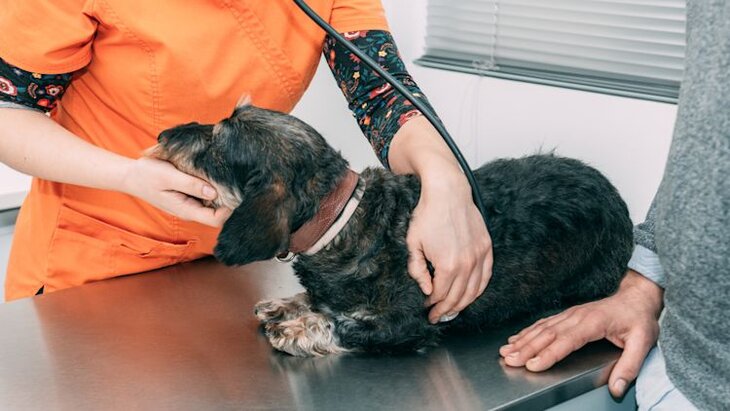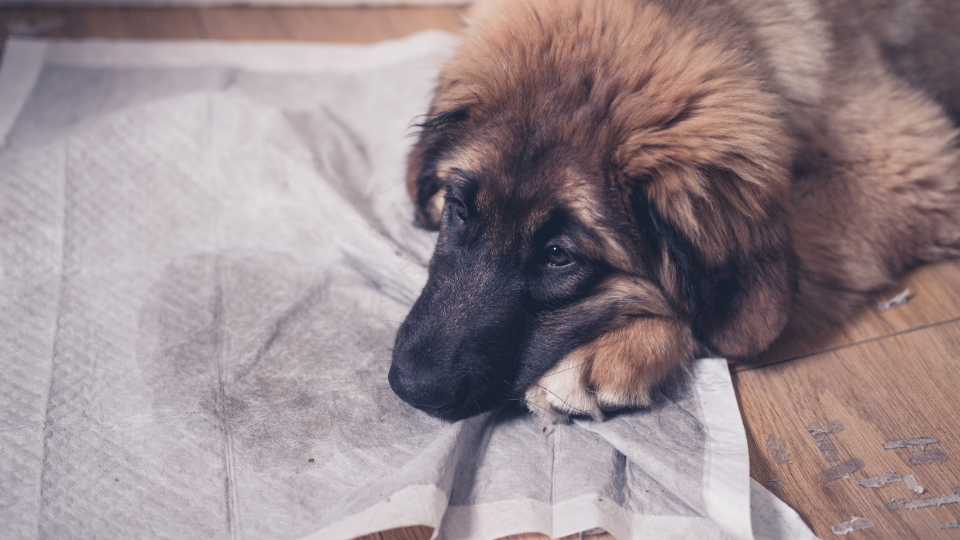Colitis in Dogs: Symptoms, Diagnosis, Treatment
Colitis in dogs is a painful and unpleasant condition that can cause your canine companion to have diarrhea and stomach upset. Thankfully, with proper treatment, colitis can go away quickly.
Read on to find out more about the symptoms of colitis in dogs, how to distinguish colitis from a simple stomach upset, and the treatment options that you have available.
Table of Contents:
Pro Tip: Trips to the vet can be expensive without financial assistance. Pet insurance offers pet parents the ability to provide better medical care for their loved ones by reimbursing a portion of covered veterinary expenses paid out-of-pocket.
What Is Colitis in Dogs?
Colitis is defined as inflammation of the colon (large intestine) that results in reduced water absorption and impaired ability to store feces in the colon.
Symptoms of Colitis in Dogs
The most prominent symptom of colitis in dogs is diarrhea. Other canine colitis symptoms include:
- Difficulty and straining while defecating
- Pain and inflammation in the abdomen
- A sense of sudden urgency
- Increased defecation with small volume
- Fresh blood present in stool
- Mucus or slime present in stool
- Dehydration from loss of fluids
- Irregular eating habits
- Weight loss (rare)
- Gaseousness
- Constipation
- Vomiting
- Dull coat
- Lethargy
How long does colitis last in dogs?
The severity and duration of colitis symptoms in dogs depends on whether the condition is chronic or acute.
- Chronic colitis causes an ongoing display or recurrent bouts of symptoms that typically last two to four weeks. The condition can be chronic (episodic), meaning that it comes and goes in repeated waves, or chronic (constant). Either case can be very taxing and lead to secondary health problems in dogs. This type of colitis is usually indicative of an underlying disease that causes symptoms to manifest.
- Acute colitis (commonly known as “stress colitis”) is a one-off circumstance that occurs suddenly and intensely. It usually lasts several days following a stress-inducing incident - such as overnight boarding or firework explosions - then the symptoms subside and the dog returns to normal health. These cases are generally minor and can be cleared up quickly with prescription medication by a veterinarian.
Causes of Colitis in Dogs
Colitis in dogs is caused by internal or external stress that triggers inflammation in the large intestine. Diarrhea is a clinical sign of many health disorders, so it can often be hard to pin down the underlying problem without diagnostic tests.

In many cases, colitis is caused by dietary indiscretion (usually involved with eating new treats or raiding bad food) or parasites such as hookworms, giardia, and coccidia.
Other causes of canine colitis include:
- Inflammatory bowel disease
- Gastrointestinal (GI) infections
- Colon cancer in senior dogs
- Food allergies or intolerances
- Fungal infections (such as ringworm)
- Damage or injury to the large intestine
- Poor eating habits or dietary indiscretion
- Chronic exposure to wet environments
- Swallowing a foreign object
- Ingestion of contaminated food or water
- Pancreatitis (inflammation of the pancreas)
- A secondary reaction to medications (most commonly antibiotics)
- Direct or indirect contact with an infected animal
In some cases, the answer to what causes colitis in dogs can be very vague or highly specific. For example, ulcerative colitis refers to a continuous inflammation of the canine’s colon for a variety of possible reasons, whereas granulomatous colitis is a rare, breed-specific condition that only affects breeds like French Bulldogs and Boxers.
Is Colitis in Dogs Contagious?
Colitis is not contagious because it’s not a “sickness” in itself. Rather, the condition is always a manifestation of symptoms caused by another health issue. Most underlying causes of canine colitis are not contagious. However, some are highly transmissible (such as parasitic infections) and can be easily spread from one dog to the next.
How to Diagnose Colitis in Dogs
Your vet will ask you questions related to your pet’s clinical signs and medical history and will likely ask you to bring a stool sample to check for parasites.
In some cases, ultrasounds and/or X-rays might be performed to examine the intestinal tract and the colon for obstructions or foreign bodies.
Other tests like colonoscopy or colon biopsy, blood counts, fecal cultures, or barium enema might be required as well. These are performed to rule out conditions like irritable bowel syndrome and colonic polyps or tumors.

How To Treat Colitis in Dogs
Some of these issues can be treated relatively easily, whereas others can be managed but not completely cured. If your vet confirms that your dog has colitis, there are several treatment options depending on the cause.
Nutrition
First, your veterinarian will likely try to identify the problem by suggesting fasting for a period of 24 to 48 hours to let the GI system rest and recover. Alternatively, they might recommend prescription food or a bland diet made up of rice and chicken broth for an at-home remedy.
Afterward, the introduction of high-fiber foods might be beneficial due to the fiber’s ability to slow GI transit time and possibly reduce diarrhea.
If your vet suspects that colitis is caused by food sensitivity, they might suggest a novel protein diet, i.e. a diet containing foods that haven’t been fed to your four-legged friends, such as rabbit or venison.
Pro Tip: Not all pet insurance providers cover the cost of prescription pet food. This is one of the reasons why dog owners should read the fine print on insurance policies before enrolling their pets.
Medications
Depending on your pet’s diagnosis, the vet might prescribe antimicrobial drugs to treat infections, anti-inflammatories to help with pain due to inflammation in the colon, and/or medications that manage intestinal motility. Other treatments for colitis may include probiotics for gut health and antibiotics to fight any infection that might be related to the symptoms your dog is experiencing.
Make sure to always follow your vet's instructions regarding prescription medications and recommendage doses. If your dog is not showing signs of improvement after the course of medication, take them back for a follow-up visit because additional diagnostic testing may be required.
Parasite Control
If colitis is caused by parasites or worms, the vet will likely prescribe a deworming treatment and provide advice on how and when to administer it.
Veterinary Costs for Colitis Treatment
The cost of diagnosis can be quite high when you consider the price of colonoscopies, ultrasounds, and blood work, as well as the costs associated with internal medicine specialists who are often employed in reaching a definitive diagnosis.
More severe cases of canine colitis can cost thousands of dollars. The additional cost of medication, special diets, and frequent vet visits usually range between $100 and $300 per episode if it's not severe.
Prognosis and Recovery of Canine Colitis
The prognosis will depend on the type of colitis your dog is suffering from. For dogs with chronic colitis, the short-term prognosis is good, but relapses are very likely. Additional diagnostic tests will be necessary to determine the cause and provide proper treatment.
In the case of stress colitis, treatment with medication and a simple diet change should resolve the infection or inflammation and the animal should be back to normal within three to five days.
However, for dogs with a genetic disposition to the disease, the prognosis is less enthusiastic. For instance, boxers with granulomatous colitis aren’t very likely to recover unless treatment is started very early.
How to Prevent Colitis in Dogs
One of the best ways to prevent colitis in dogs is to be careful about what they eat. Keep your pet away from the trash and unfamiliar food items, including human food. Restricting their contact with potentially sick dogs in public places (such as boarding facilities and parks) can also prevent your pet from getting sick. It is also helpful to teach your dog the ‘leave it’ command or keep him on the leash to stop him from scavenging while out on walks.
In addition to these preventatives related to food, you should also make sure to keep your four-legged friend free of parasites by giving their scheduled deworming medications and ensuring that he or she is current on all recommended vaccines.
Key Takeaways
- Colitis is a painful and unpleasant condition that results from an inflamed colon (large intestine). The most common symptom of canine colitis is diarrhea that often contains mucus and/or blood.
- Treatment will depend on the severity of the condition and how often your canine friend suffers from it.
- Most pups recover from colitis within several days but those suffering from chronic colitis will need ongoing treatment.
- Contact your vet if you suspect your dog has colitis.
- Having pet insurance coverage means you won't have to make an impossibly difficult choice between your beloved pet and your finances.
Do you want to find the best pet insurance?
Let's analyze your pet's breed, age, and location to find the right coverage and the best savings. Ready?
Analyze My PetAbout Pawlicy Advisor
The pet insurance marketplace endorsed by veterinarians, at Pawlicy Advisor we make buying the best pet insurance easier. By comparing personalized coverage and pricing differences we can save you a ton of money, up to 83% in some instances!
Instantly Compare Pet Insurance Plans
Guides
Determine If Pet Insurance Is Worth It
Comparison Charts
Find Your State
Dog Insurance
DVM
Ricky Walther, DVM, is a small animal general practitioner in the greater Sacramento, California area. Realizing the positive financial and medical impact that pet insurance can provide for pet parents and the profession, he lends support and advice to companies like Pawlicy Advisor "The Pet Insurance Marketplace") that simplify the process of connecting with veterinary financing resources.
